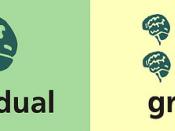1. Briefly discuss how institutions facilitated the operation of markets in the P.O.W. camp.
Institutions are made up of (and by) individuals and function based on the collective individuals' need to maximize utility. Therefore, similar economic and social hierarchies and institutions exist in both prison and the outside world. We have identified three major categories of societal institutions found in the Oflag P.O.W. camp, which individually, and by interacting with each other, guide the development of the economic market. These institutions can be categorized by the manner in which they originate and facilitate societal functioning. Three major institutions found to facilitate markets in Oflag are social, economic, and political institutions.
The man-made institutions that most directly facilitated the operations of the markets were the social and economic institutions. Because provisions were allocated without regard to individual needs and demands, trade was immediately necessary. The P.O.W.s initially established Exchange and Mart notice boards, which created an open trading market, and this provided a semi-permanent paper trial of various commodities' past and current asking/selling prices, relative to cigarettes. Cigarettes became the established currency, and over time, a general consensus was established. Understandably, in camps with high level of institutional organization, there was an almost fixed cost associated with each good, and in less-organized camps where no notice board existed, such as transit camps, prices varied widely.
As business practices progressed and market norms became more defined, so did the individual's entrepreneurial inclination. A man who sold coffee and tea could hire laborer and an accountant to facilitate his operation. Laundrymen would wash clothes in return for a certain number of cigarettes, despite the current supply of cigarettes in the market. The role of middlemen and professional traders emerged, and people could make a profit through arbitrage or by buying/selling against expected shortages/influx of supplies in the market. Credit entered into market transactions, as people were allowed to pay in advance or in the future.
Near the end of the war, a restaurant was launched. To facilitate business, a paper currency was issued, with the restaurant acting as the bank. Individuals would sell their raw food materials to the restaurant in exchange for a paper note. The restaurant would then, in turn, sell the food back to the customers and regain their notes. This movement away from cigarette currency was necessary in order to protect the operation against deflation, and the paper money could be backed 100% by food, which never left the restaurant.
Ultimately, the entire market was subject to regulation by the governing body of the prison camp, the Germans, and the individual prison officers. The political institutions facilitated the operation within the camps by allowing parcels to come in, controlling the inflows of people and of supplies, and providing the forum in which the whole market came into existence.





